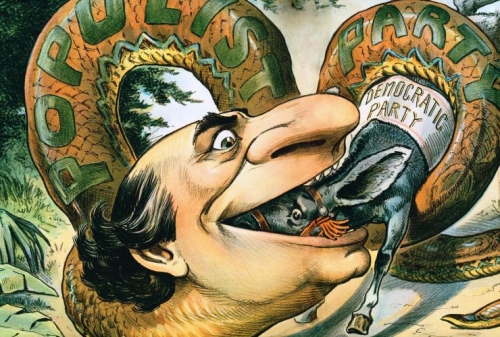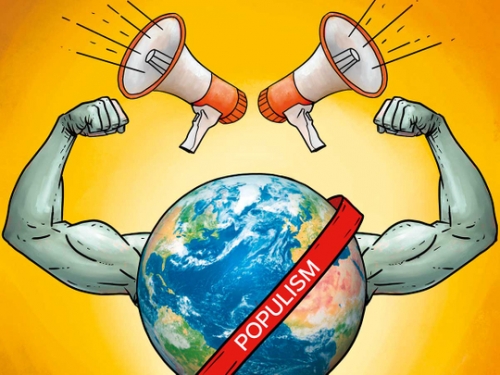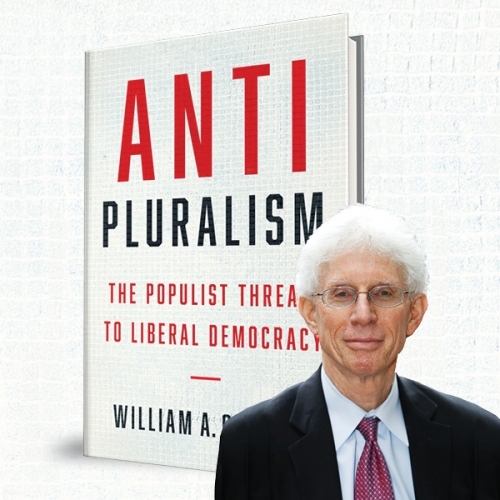William A. Galston
Anti-Pluralism: The Populist Threat to Liberal Democracy
New Haven: Yale University Press, 2018
“It is time for an open and robust debate on issues of immigration, identity politics, and nationalism that liberals and progressives have long avoided.”—William Galston
Galston is right. I will debate any liberal or progressive about these topics, and if they don’t want to debate me, I will help arrange a debate with whomever they prefer. Contact me at editor@counter-currents.com [2].
William Galston (born 1946) has had a long career spanning both political theory and practice. He received his Ph.D. in political theory from the University of Chicago and has strong Straussian credentials, although he aligns himself with the center-Left, not the neocons. (Arguably, this is a distinction without a difference.) Galston has taught in the political science departments of the University of Texas at Austin and the University of Maryland. He is now affiliated with the centrist Brookings Institution. Galston has worked for the presidential campaigns of John Anderson, Walter Mondale, Bill Clinton, and Al Gore. He was deputy assistant for domestic policy in the Clinton White House from January 1993 to May 1995.
Galston’s Anti-Pluralism: The Populist Threat to Liberal Democracy presents itself as a “liberal-democratic” centrist polemic against the populist Right, in much the same vein as Francis Fukuyama’s Identity: Contemporary Identity Politics and the Struggle for Recognition (2018, see my review here [3], here [4], and here [5]) and Mark Lilla’s The Once and Future Liberal: After Identity Politics (2017, see my review here [6]).
But Galston, like Fukuyama and Lilla, received a Straussian education, so chances are good that his arguments are not entirely straightforward. Indeed, all three books can also be read as polemics against the Left, since they argue that Left-wing excesses are the driving force behind the rise of Right-wing populism. Therefore, if the “liberal democratic” establishment wishes to take the wind out of the sails of Right-wing populism, it needs to rein in the excesses of the far Left.
Galston’s theoretical account of liberal democracy is pretty much standard centrist boilerplate. His theoretical account of populism depends heavily of Jan-Werner Müller’s extremely flawed book What Is Populism?, which I have reviewed [7] already.
For Galston, following Müller, liberal democracy is essentially “pluralist” and populism is “anti-pluralist.” By this, he does not mean that liberal democracies recognize that every healthy society balances the needs of the family, civil society, and the state. Nor does he mean that a healthy polity has differences of opinion that might express themselves in a plurality of political parties. Nor does he mean that a healthy society has different classes. Nor does he mean the separation of powers or the mixed regime. Populists can embrace all those forms of pluralism, but without liberalism.
Instead, for Galston and Müller, pluralism just means “diversity,” i.e., the presence of minorities, which he describes as “helpless” and in need of protection from the tyranny of the majority. By “minorities,” Galston doesn’t mean the people who lose a vote—a group that changes with every vote—but rather more fixed minorities, such as social elites and ethnic minorities.
But what if some minorities are not helpless but actually dangerously powerful? What if liberal democracy has long ceased to be majority rule + protection for minorities? What if liberal democracy has become, in effect, minority rule? What if these ruling minorities are so hostile to the majority that they have enacted policies that not only economically pauperize them, but also destroy their communities with immigration and multiculturalism, and, beyond that, seek their outright ethnic replacement? Liberal democracy is really just a euphemism for minority rule, meaning rule by hostile elites. Naturally, one would expect some sort of reaction. That reaction is populism.
Galston understands this. He recognizes the four major trends that Roger Eatwell and Matthew Goodwin argue are responsible for the rise of populism in their book National Populism: Revolt Against Liberal Democracy: popular distrust of elites, the destruction of communities by immigration and multiculturalism, the economic deprivation—falling largely on the working-class and middle-class—caused by globalization, and the consequent political dealignments in relation to the post-war center-Left/center-Right political establishment. (See my discussions of Eatwell and Goodwin here [8], here [9], and here [10].)
In his Introduction, Galston notes that “The people would defer to elites as long as elites delivered sustained prosperity and steadily improving living standards” (p. 2). Galston actually describes elitism as a “deformation” of liberal democracy: “Elitists claim that they best understand the means to the public’s ends and should be freed from the inconvenient necessity of popular consent” (p. 4).
People stopped trusting elites when economic globalization, immigration, and multiculturalism started making life worse, and not just economically but also in terms of culture and public safety (crime, terrorism): “A globalized economy, it turned out, served the interests of most people in developing countries and elites in advanced countries—but not the working and middle classes in the developed economies . . .” (p. 3). “Not only did immigrants compete with longtime inhabitants for jobs and social services, they were also seen as threatening long-established cultural norms and even public safety” (p. 3).
Galston outlines how our out-of-touch, hostile, increasingly panicked establishment can head off populism before it leads to genuine regime change:
. . . there is much that liberal democratic governments can do to mitigate their insufficiencies. Public policy can mitigate the heedlessness of markets and slow unwanted change. Nothing requires democratic leaders to give the same weight to outsiders’ claims as to those of their own citizens. They are not obligated to support policies that weaken their working and middle classes, even if these policies improve the lot of citizens in developing countries. They are certainly not obligated to open their doors to all newcomers, whatever the consequences for their citizenry. Moderate self-preference is the moral core of defensible nationalism. Unmodulated internationalism will breed—is breeding—its antitheses, an increasingly unbridled nationalism. (p. 5)
The Left, of course, has no problem using public policy to rein in markets, but they vehemently reject Galston’s “moderate self-preference,” which is what some people would call putting “America first.” The American Left is committed to open borders, which will pauperize the American middle and working classes as surely as Republican deindustrialization and globalization.
In chapter 6, “Liberal Democracy in America: What Is to Be Done?,” Galston recommends prioritizing economic growth and opportunity and making sure it is widely shared by everyone. The “second task requires pursuing three key objectives: adopting full employment as a principal goal or economic policy; restoring the link between productivity gains and wage increases; and treating earned and unearned income equally in our tax code” (p. 87). In effect, Galston proposes halting the decline of the American middle class that has been ongoing for nearly half a century by ensuring that productivity gains go to workers, not just capitalists. As a populist, these are policies that I can support.

Galston also suggests that a corrective to the decline in labor unions and worker bargaining power due to globalization can be offset by measures to “democratize capital through . . . worker ownership of firms, that share the gains more broadly” (p. 99).
Of course productivity can be raised in two ways: by making labor more productive through technological and organizational improvements—or simply by cost-cutting. Practically all the “productivity” gains of globalization are simply due to cost-cutting by replacing well-paid white workers with poorly paid Third Worlders, either by sending factories overseas or by importing legal and illegal immigrants. If public policy is to promote genuine economic growth, it needs to promote genuine increases in productivity, which means technological innovations, as well as better education and all-round infrastructure.
But technology doesn’t just make workers more productive. It also puts them out of work. However, if workers have no incomes, then they cannot purchase the products of automation. (Production can be automated, but consumption can’t.) So how can we maintain technological growth, a healthy middle class, and consumer demand at the same time? Galston points to a partial solution:
. . . the public should get a return on public capital the benefits of which are now privately appropriated. When the government funds basic research that leads to new medical devices, the firms that have relied on this research should pay royalties to the Treasury. When states and localities invest in infrastructure that raises property values and creates new business opportunities, the taxpayers should receive some portion of the gains. One might even imagine public contributions to a sovereign wealth fund that would invest in an index of U.S. firms and pay dividends to every citizen. (p. 99)
The key point is that when machines put us out of work, we should not fall into unemployment but rise into the class of people who live on dividends. A more direct route to the same outcome would be to adopt Social Credit economics, including a dividend or Universal Basic Income paid to every citizen. (For more on this, see my essay, “Money for Nothing [11].”)
Galston does not mention simple, straightforward protectionism, but there are sound arguments for it, and the arguments against it have been refuted. (See Donald Thoresen’s review [12] of Ian Fletcher’s Free Trade Doesn’t Work.)
The bad news for National Populists is that Galston’s proposals, if actually adopted, would significantly retard our political success. The good news is that Galston’s proposals are simply what Eatwell and Goodwin call “National Populism lite,” which means that Galston is abandoning globalism in principle. What he refuses to abandon is the existing political establishment, which he thinks will retain power only by abandoning globalism.
Another piece of good news is that the establishment will probably never listen to Galston. They are fanatically committed to their agenda. They are not going to drop their commitment to globalism in favor of nationalism, even if it is the only way to preserve themselves. Galston is trying to appeal to the rational self-interest of the existing elites. But they are not rational or even especially self-interested. Sometimes people hate their enemies more than they love themselves. But National Populists would implement Galston’s policies, and more. So perhaps he is rooting for the wrong team.
A third piece of good news is that Galston realizes that economic reforms are not enough. Galston also cites studies showing that populist Brexit and Trump voters were not motivated solely by economic concerns (pp. 76–77). They were also motivated by concerns about identity. Since Galston is talking primarily about white countries, National Populism is a species of white identity politics. Since Left-wing populism rejects nationalism and white identity politics (and only white identity politics), it can only address white voters on economic issues, which means that it has less electoral appeal than Right-wing populism.
As I never tire of pointing out, what people want is a socially conservative, nationalistic, interventionist state that will use its power to protect the working and middle classes from the depredations of global capitalism. The elites, however, want social liberalism and globalism both in politics and economics.

The two-party system is designed to never give the people what they want. The Republicans stand for conservative values and global capitalism. The Democrats stand for liberal values and the interventionist state. When in power, the parties only deliver what the elites want, not what the people want.
The consequence is neoliberalism: an increasingly oligarchical hypercapitalist society that celebrates Left-wing values. Galston offers interesting support for this thesis by quoting Bo Rothstein, “a well-known scholar of European social democracy” who argues (these are Rothstein’s words) that “The more than 150-year-old alliance between the industrial working class and the intellectual-cultural Left is over” (p. 103). Rothstein elaborates:
The traditional working class favors protectionism, the re-establishment of a type of work that the development of technology has rendered outdated and production over environmental concerns; it is also a significant part of the basis of the recent surge in anti-immigrant and even xenophobic views. Support of the traditional working class for strengthening ethnic or sexual minorities’ rights is also pretty low. (p. 103)
Since the Left’s values are the “exact opposite,” Rothstein proposes that the Left ally with the “new entrepreneurial economy.” Hence the marriage of some of the biggest corporations on the planet—Facebook, Apple, Amazon, Microsoft, Google—with trannies, POCs, Muslims, feminists, and global warming fantasists. This coalition thinks it will win through replacing the white working and middle classes with non-whites. Galston notes that Democratic Party circles in the US hold essentially the same views:
The best known have based their case on long-cycle demographic shifts. There is a “rising American electorate” made up of educated professionals minorities, and young people, all groups whose share of the electorate will increase steadily over the next two generations. These groups represent the future. The white working class, whose electoral share has dwindled in recent decades and will continue to do so, is the past. This does not mean that the center-left should ignore it completely. [For instance, on economic matters.] It does mean that there should be no compromise with white working-class sentiments on the social and cultural issues that dominate the concerns of the rising American electorate coalition. (p. 103)
This is a crystal-clear statement of the White Nationalist thesis that the Left is counting on—and promoting—the slow genocide of whites [13] through race-replacement immigration in order to create a permanent Left-wing majority. What could possibly go wrong? Galston drily notes that “This was the theory at the heart of Hillary Clinton’s presidential campaign.”
Obviously, there was going to be a reaction. The Left has been partying like whites are already a minority, but that’s not true yet. White demographic decline is obviously a serious threat if we do nothing about it. But there is nothing inevitable about white demographic decline. It is the product of particular political policies. Thus it can be reversed by different policies. And, as Eatwell and Goodwin argue in National Populism, we still have some decades to turn things around, although of course the time frame varies from country to country. Furthermore, National Populist political movements, once they break through, are highly competitive because, unlike the center-Left and center-Right, we will actually give the people what they want, for a change.
Galston is well aware that the center-Left cannot compete with National Populists on economic ground alone:
If concessions on cultural and social issues are ruled out, appeals to the white working class will have to be confined to economics. . . . The difficulty, as we have seen, is that the audience for this economic appeal cares at least as much about social and cultural issues. Immigration, demographic change, and fears of cultural displacement drove the Brexit vote, and they were the key determinants of Donald Trump’s victory. . . .
So the American center-left has a choice: to stand firm on social and cultural issues that antagonize populism’s most fervent supporters, or to shift in ways for which it can offer a principled defense. It is time for an open and robust debate on issues of immigration, identity politics, and nationalism that liberals and progressives have long avoided. (pp. 103–104)
Galston is absolutely correct here. The Left will not win by bread alone. It needs to address questions of values and identity. But it can’t really do so without abandoning its own values and identity. We really do need open and honest debate on immigration, identity politics, and nationalism, but the Left cannot permit this, because they know they’ll lose.
Galston also recognizes that tribal sentiments—meaning a preference for one’s own—are an ineradicable part of human nature. Because of this, “The issue of national identity is on the table, not only in scholarly debates, but also in the political arena. Those who believe that liberal democracy draws strength from diversity have been thrown on the defensive. Large population flows . . . have triggered concerned about the loss of national sovereignty” (p. 95).
Galston approvingly quotes Jeff Colgan and Robert Keohane’s statement that “It is not bigotry to calibrate immigration levels to the ability of immigrants to assimilate and to society’s ability to adjust” (p. 96). Of course, assimilation is the opposite of multiculturalism. Galston suggests that US immigration policies should shift toward meritocratic concerns about economic contribution, put increasing emphasis on English fluency, and demand greater knowledge of American history and institutions. The main virtue of these proposals is that they would dramatically decrease the numbers of immigrants (p. 96). I heartily agree with Galston’s final remarks on immigration:
One thing is clear: denouncing citizens concerned about immigration as ignorant and bigoted (as former British prime minister Gordon Brown did in an ill-fated election encounter with a potential supporter) does nothing to ameliorate either the substance of the problem or its politics. (p. 96)
But again, Leftists are unlikely to take Galston’s advice. If the Left moved away from moralistic condemnations of immigration skepticism and actually debated the topic, they would simply lose. Indeed, one of the reasons why the Left supports race-replacement immigration is because they have given up on convincing white voters and simply wish to replace them.
Galston also chides Leftists for their arrogance. One of the strongest predictors of Left-wing values is the amount of time people spend in higher education, especially the liberal arts and social sciences. This does not mean that such people are genuinely educated, of course, but they are flattered into thinking they are more enlightened and intelligent than ordinary people, which feeds into populism:
Put bluntly, if Americans with more education regard their less educated fellow citizens with disrespect, the inevitable response of the disrespected will be resentment coupled with a desire to take revenge on those who assert superiority. . . . elites have a choice: they can try to take the edge off status differences or they can flaunt them. . . . It is up to privileged Americans to take the first step by listening attentively and respectively to those who went unheard for far too long. (p. 102)
Galston is right, of course, but there is little likelihood that this recommendation—or any of his others—will be heeded. The pretense of intellectual superiority, no matter how hollow, is close to the core of Leftist identity. To win by abandoning one’s identity feels like losing to most people. Thus they will tend to hold fast to their identities and hope that somehow reality will accommodate their wishes.
William Galston is a perceptive, rational, and courageous writer. I can’t help but respect him, even though he is on the other side. He is a liberal democrat. I am an illiberal democrat. He wants to preserve the current establishment. I don’t. Given that the current establishment has fundamentally betrayed our people—with the Left openly pinning its hopes on the slow genocide of whites and the Right too stupid and cowardly to stop it—we need genuine regime change.
Even though Anti-Pluralism is a critique of National Populism, I find it a highly encouraging book. Rhetorically, the book was often cringe-inducing. Evidently Galston thinks that to communicate difficult truths to liberals, they need a great deal of buttering up. But in terms of its substance, Galston—like Fukuyama and Lilla—concedes many fundamental premises to National Populists, and the only way he can envision stopping National Populism and keeping the existing political establishment in power is by adapting National Populism lite. In short, he has all but conceded us the intellectual victory. Our task is now to achieve it on the political plane.







 del.icio.us
del.icio.us
 Digg
Digg
